Question:
Dear Rabbi Sprung,
Last Shabbos, I stayed at my father’s bedside in a hospital (in Eretz Yisrael). As I walked through the hallway, I saw one of the workers repairing the Shabbos urn. The urn in question had a Mehadrin Hechsher for Shabbos usage. I would like to know whether it was permissible to use the urn afterward or if its use would have been forbidden under the prohibition of Ma’aseh Shabbos.
Answer:
It would seem to be permissible.
Full Answer:
The Shulchan Aruch rules (O.C. 318:2):
If a person slaughters [an animal] for a Choleh on Shabbos, whether he became ill yesterday or today, a healthy person may eat raw [meat] from it (on Shabbos). But if a person cooks (or performs other Melachos) for a Choleh, neither a healthy person nor a Choleh sheEin Bo Sakana may [benefit from it] (on Shabbos) for we are concerned that he will increase [the quantity of food] for him (“Shema Yarbeh Bishvilo”).
The distinction between Shechita and Bishul is based on the following rationale: If a person slaughters an animal for a Choleh on Shabbos, they must slaughter the entire animal, even though the Choleh only requires a small portion. This is because it is Halachically impossible to prepare the meat otherwise. Therefore, there is no concern that the Shochet will slaughter additional animals for other people since one animal will be sufficient for the patient’s needs, whereas the concern of “Shema Yarbeh Bishvilo” exists for other Melachos. For example, if a person cooks for a Choleh on Shabbos, perhaps he will cook additional pieces of meat for others thereby increasing the number of Isurim that he transgresses. This is why the Chachamim forbade a healthy person from deriving benefit from these Melachos.
A further example can be found in the Shulchan Aruch’s ruling (276:1) that when a candle has been lit for a Choleh, others may benefit from it since “a candle for one is a candle for a hundred” thus there is no concern that one will increase the amount of light for others. However, if a person lights a fire for a Choleh there is concern that he will add fuel for the benefit of others, thus there is a Machlokes haPoskim as to whether a healthy person may derive benefit from it.
R’ Shlomo Zalman Auerbach zt”l discusses a case when the main circuit breaker in a house or apartment building goes out on Shabbos and there is a Choleh in one of the rooms or apartments who needs light. If possible, one should turn off the other lights (that are not necessary for the Choleh) before switching on the main breaker, and if he doesn’t, it is forbidden to benefit from the electricity. But if it is impossible to do this, such as when great haste is required, when the main power is restored to the building, it is permissible to benefit from all of the light. This Heter applies to everyone, for the reason outlined above, namely, that there is no concern of Shema Yarbeh Bishvilo.
We explained above that the Shulchan Aruch rules that there is a concern of Shema Yarbeh when the Melacha of Bishul must be performed. However, this may not always be the case.
The Gemara (Shabbos 122a, see Rashi s.v. “Bichdei”) implies that if non-Jews heat a bathhouse (in other words, they boil water) for Jews on Shabbos there is no concern of Shema Yarbeh Bishvilo.[1] R’Yehoshua Neuwirth zt”l (Shemiras Shabbos Kehilchasa 32, footnote 204) notes that this is a case of Bishul where we do not pose a concern of Shema Yarbeh Bishvilo as we apply the rule of “Ner l’Echad, Ner l’Me’ah” here. As such, there is not a fundamental distinction between Bishul and other Melachos,but, rather, we must look at each specific act. If it is a single action for a fixed amount (e.g., the entire bathhouse which is heated at once), then Shema Yarbeh does not apply. He then discusses an example of a person who turns on a boiler for a Choleh sheYesh Bo Sakana. Since it is “impossible” for the boiler not to be full, and he is merely switching it on, perhaps it would be permissible for others to benefit from the hot water.
However, he cites R’ Shlomo Zalman who suggests that the Gemara only refers to an action performed by a non-Jew, but it would not be permitted when performed for Pikuach Nefesh of a Jew, evenif another Jew performed it. In addition, perhaps we should forbid heating the boiler, lest one would heat the boiler in the future when heating a small pot of water would suffice.
Rav Shlomo Zalman references the Aruch haShulchan (318:16) who states:
I have heard those who say that nowadays when they set up a samovar for a Choleh on Shabbos, a healthy person may drink from it. [They claim that] just like one cannot obtain a k’Zayis of meat without slaughtering [the entire animal], so is it impossible to boil a little water in a samovar; rather it must be filled completely else the copper will melt. [They likewise claim] that the leaves called “tea” cannot be measured exactly for one person and therefore one must make more than is necessary for one Choleh. Everyone knows that it is impossible to do otherwise, hence there is no concern of Shema Yarbeh.
As for the concern that when [the others] drink [from the samovar] and subsequently want to drink more they will pour in additional water and add more tea leaves, we need not be concerned about this for [Chaza”l] were not concerned that someone will cook an additional pot [of food], only that he will add to the original pot. Why should we be concerned that a person will cook something entirely new?
As for the concern that the Choleh would have set up a small samovar [initially], but now [that he knows that others will be permitted to drink from it] he will set up a large one – why should we be concerned about this either? If this was a concern, then we should similarly be concerned that a person will slaughter a bigger bird!
Nevertheless, it does not appear to be correct to permit it, for if we were to permit healthy people [to drink from it] it is very likely that several people will drink from it. In that case, we should certainly be concerned that they will add more of the tea leaves and that they will add a lot more than they would have if it was just for the Choleh. We have never been accustomed to permit this. Even if a non-Jew were to set it up it would be forbidden since it makes no difference, as has been explained.
A careful reading of the Aruch haShulchan indicates that he holds there is room for leniency if it is clear that there will not be anything added for anyone other than the Choleh, and that [nearly] the entire amount is needed for him (although some will be left over), as Rav Neuwirth argued. However, “they were never accustomed to permit it”.[2]
It would seem in our case that there is even more room for leniency than in the cases discussed by the Poskim. Hospital protocols dictate that, for safety reasons, only the permanent appliances are used. Thus, when water is heated for an endangered Choleh the same urn will always be used. Furthermore, there is no way to adjust the volume of water in the urn. Therefore, there would seem to be very little concern for Shema Yarbeh Bishvilo.
[1] [Editor’s note: The Gemara there states that a Jew may not benefit from Melacha performed on Shabbos by a non-Jew who is acquainted with him. The Gemara asks from the case of the Mishna where Rabban Gamliel and the Zekeinim arrived in port on Shabbos and a non-Jew made a ramp to disembark from the ship and they then used that ramp themselves, as the non-Jew who had been traveling with them clearly was acquainted with them. Abaye and Rava argue as to the reason why it was permissible for them to use the ramp – Abaye explains that it was “Shelo b’Fanav”, i.e., Rabban Gamliel and the Zekeinim were not present when he built the ramp, and we are therefore unconcerned that he did it on their behalf. Rava says that it would have been permissible even if the ramp was built in the presence of Rabban Gamliel as he invokes the concept of “Ner l’Echad, Ner l’Me’ah”. The Gemara raises a question from a ruling in a B’raisa that a bathhouse in a city with a majority population of Jews that was heated on Shabbos (by non-Jews) cannot be used until after enough time has elapsed for the bathhouse to have been heated after Shabbos. Rashi explains that “Chimum l’Echad, Chimum l’Meah” and it was “Shelo b’Fanav” so according to both Abaye and Rava it should be Mutar to bathe there immediately after Shabbos. R’ Neuwirth zt”l notes that we see from this Gemara and Rashi that we are not concerned about “Shema Yarbeh Bishvilo” in this case, as we apply the rule of “Ner l’Echad, Ner l’Meah” even though this is a case of Bishul.]
[2] The Aruch haShulchan also asserts that if the Choleh uses his regular samovar there is no concern that a larger samovar will be used for the other people (though it is nevertheless forbidden for others to drink from it lest he come to add more water to the smaller urn). In this we see a difference between the Aruch haShulchan’s and Rav Shlomo Zalman’s arguments. As we explained above, Rav Shlomo Zalman considers forbidding heating a larger vessel, lest one does so on another occasion when a smaller vessel could be used.














Add comment